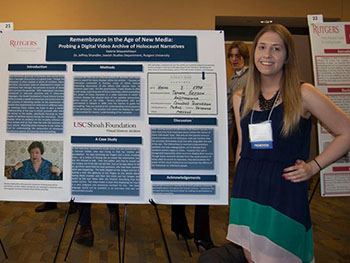
Valerie Mayzelshteyn
When reading a published article or book, it can be easy to forget how many hundreds of hours of research the author put in in order to bring the project to fruition. Many scholars do this research completely on their own, but some are lucky enough to have an assistant.
Jeffrey Shandler, former Institute Fellow at USC Shoah Foundation and professor at Rutgers University, is one such scholar. Rising junior Valerie Mayzelshteyn has just completed a year as Shandler’s research assistant, during which time she conducted valuable research for his upcoming projects in the Visual History Archive and learned lessons from Holocaust survivors that she will not soon forget.
Mayzelshetyn is an English and political science double major at Rutgers. She learned about Shandler’s research topics at the Rutgers Aresty Research Center for Undergraduates and applied to be his assistant for the 2014-15 school year.
Shandler’s research draws heavily from the Visual History Archive and Mayzelshetyn speaks fluent Russian, so her main job was to focus on Russian language testimonies. She summarized and organized portions of interviews onto Microsoft Excel documents, and Shandler would tell her which interviews he wanted her to translate so he could study them further. She focused particularly on Russian testimonies that referenced the Yiddish language and culture or in which the interviewee displayed his or her injuries from the Holocaust.
She said watching the testimonies, with their themes of loss, persecution and intolerance, was a moving and emotional experience. She would often have to remind herself, after watching a particular interview and becoming very invested in the survivor’s life story, that it was only one of thousands in the Visual History Archive she had not yet seen.
“The personal nature of each interview itself, combined with the vast scale of the archive as a whole, truly stressed the depth and scope of the persecution of Jewish individuals during the Holocaust in a way that other Holocaust-based media is not always able to,” Mayzelshteyn said.
Throughout her life, Mayzelshetyn said, she has thought that raising awareness about the Holocaust is very important. From her experience working with Dr. Shandler, she has gained not only valuable research skills, but a new understanding of individuals’ experiences during the Holocaust.
“The passing of time often leads to the erasure of history and I feel that this archive of interviews is a large aid in preventing this from happening,” Mayzelshteyn said. “The testimonies in the archive will definitely remain in my memory as permanent reminders of the challenges that these people faced and their ability to overcome them.